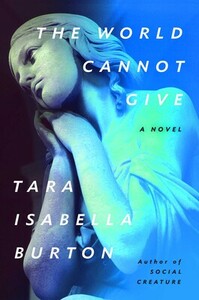Take a photo of a barcode or cover
scrumptious dark academia setting & ambience with insufferable characters. i couldn’t put it down!! not five stars because i really would’ve loved like 30 more pages to slow down the pace of the ending.
also pls stop doing books the disservice of comparing them to the secret history!!!! no book will ever be that good, but i loved reading this! thanks
also pls stop doing books the disservice of comparing them to the secret history!!!! no book will ever be that good, but i loved reading this! thanks
dark
mysterious
tense
medium-paced
Plot or Character Driven:
Character
Strong character development:
No
Loveable characters:
No
Diverse cast of characters:
No
Flaws of characters a main focus:
Yes
adventurous
dark
emotional
sad
tense
fast-paced
Plot or Character Driven:
Character
Strong character development:
Complicated
Loveable characters:
No
Diverse cast of characters:
No
Flaws of characters a main focus:
Yes
Laura, a sensitive teenager, gets her parents to send her to the school where her favorite author wrote her favorite book, right before he went off to be killed in a war. Laura hopes to find some kind of magic there, and she does in the form of Virginia, a very intense girl who rules the school choir with an iron fist. Laura is immediately besotted with Virginia, and finds herself suppressing her better instincts again and again. Mainly what Virginia loves is control, though, and when it slips through her fingers, things can only go badly.
If I could sleep I wouldn't have got through this so quickly. Hell, maybe I wouldn't have finished it at all.
If I could sleep I wouldn't have got through this so quickly. Hell, maybe I wouldn't have finished it at all.
dark
mysterious
medium-paced
Plot or Character Driven:
Character
Strong character development:
No
Loveable characters:
Complicated
Diverse cast of characters:
Yes
Flaws of characters a main focus:
Yes
It felt like things were happening but nothing really went anywhere. I guess, I can also just attribute this with not connecting or relating to the MC.
I rarely put down a book and think “huh.” This was an interesting read that took me on quite the journey. I am going to be thinking about it for a long time. I think this is a lower rated one for me because the ending was so unsatisfying, but perhaps that was the point. Tara’s command of language is the main thing that kept me hooked, her characters were quite vibrant and intriguing, just distanced enough from reality to still be inviting. I enjoyed much of the story and what it had to say but it’s left me feeling perplexed and empty (?).
3 stars. So close to being something really good but it unfortunately misses the mark. While the writing was decent, and some of the themes in this were interesting, a lot of the dialogue was very cheesy and none of the characters are fleshed out or memorable.
Laura is a blank slate of a character. Nothing stands out about her. She’s easily influenced and she never really becomes her own person in the end which I thought was an odd choice. The main catalyst of the story is Virginia and even she was underdeveloped and cliche. I didn’t understand why everyone was so under her spell. She had no depth and her personality was so dry.
The ending should’ve hit harder but again I didn’t care about any of the characters so I honestly didn’t care and I didn’t feel any type of way about it which sucks because it was pretty shocking.
I didn’t think this was terrible, nor did I hate it. It honestly had a lot of potential but it never really came together. Three stars for the writing, the themes, and the quick pacing.
Laura is a blank slate of a character. Nothing stands out about her. She’s easily influenced and she never really becomes her own person in the end which I thought was an odd choice. The main catalyst of the story is Virginia and even she was underdeveloped and cliche. I didn’t understand why everyone was so under her spell. She had no depth and her personality was so dry.
The ending should’ve hit harder but again I didn’t care about any of the characters so I honestly didn’t care and I didn’t feel any type of way about it which sucks because it was pretty shocking.
I didn’t think this was terrible, nor did I hate it. It honestly had a lot of potential but it never really came together. Three stars for the writing, the themes, and the quick pacing.
dark
mysterious
medium-paced
Plot or Character Driven:
A mix
Strong character development:
No
Loveable characters:
No
Diverse cast of characters:
Complicated
Flaws of characters a main focus:
Yes
dark
reflective
Oh my. What a book. You're dragged into the story as you read about a girl who was exactly like you were at that age, devouring philosophy books that your brains could barely handle, obsessed with being Good as you were convinced that your actions matter on a celestial scale.
This really is dark academia as it should be. It skips the tropes and plunges into the heart of the matter.
The person who recommended this to me, sold it to me by saying that this story is a lot like The Empusion by Olga Tokarczuk and it's true. There are so many parallels that it's kinda uncanny.
This really is dark academia as it should be. It skips the tropes and plunges into the heart of the matter.
The person who recommended this to me, sold it to me by saying that this story is a lot like The Empusion by Olga Tokarczuk and it's true. There are so many parallels that it's kinda uncanny.
This book had absolutely nothing meaningful or interesting to say. It was clumsily written and a soggy pastiche of a bunch of other more effective work. I feel like I could really have liked it in theory, but the intellectual blandness of the execution made it just embarrassing to read. Yuck.






